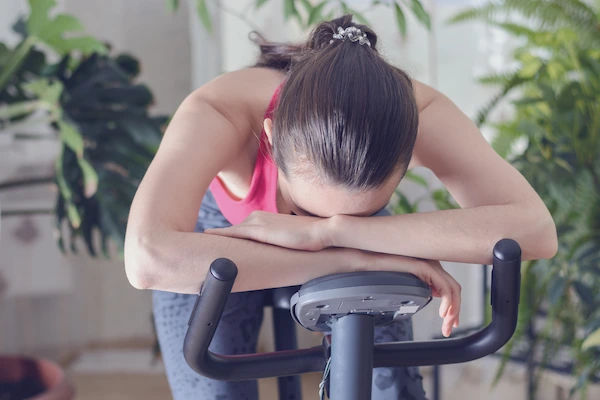How To Reduce Dizziness?
Feeling lightheaded or unsteady? Learn how to reduce dizziness with simple remedies, lifestyle tips, and when to seek medical help for lasting relief and balance.

Written by Dr Sonia Bhatt
Last updated on 3rd Jul, 2025

Introduction
Dizziness is a common issue that many people experience at some point in their lives. It can feel like lightheadedness, unsteadiness, or even a spinning sensation (vertigo). While dizziness is often temporary and harmless, it can sometimes indicate an underlying health problem. The good news is that there are several ways to manage and reduce dizziness effectively.
Understanding Dizziness
Dizziness is not a disease itself but a symptom of various conditions. It can be caused by problems in the inner ear, dehydration, low blood pressure, anxiety, or other medical issues. Some people describe dizziness as:
Feeling faint or lightheaded
A spinning sensation (vertigo)
Loss of balance or unsteadiness
A floating or heavy-headed feeling
Common Causes of Dizziness
Some of the common causes of dizziness include:
1. Inner Ear Problems: The inner ear helps control balance. Conditions like Benign Paroxysmal Positional Vertigo (BPPV), Meniere’s disease, or infections can disrupt balance and cause dizziness.
2. Low Blood Pressure: A sudden drop in blood pressure (like when standing up too fast) can lead to lightheadedness.
3. Dehydration: Not drinking enough water can cause dizziness, especially in hot weather or after intense exercise.
4. Anaemia: Low iron levels reduce oxygen supply to the brain, leading to dizziness.
5. Anxiety & Stress: Panic attacks or chronic stress can trigger dizziness.
6. Medications: Some blood pressure medications, sedatives, or pain relievers may cause dizziness as a side effect.
7. Migraines: Some people experience dizziness before or during a migraine attack.
How to Reduce Dizziness?
Ways to reduce dizziness are as follows:
1. Stay Hydrated
Dehydration is a common cause of dizziness. Make sure to drink enough water throughout the day, especially if you are active or in a hot climate. Avoid excessive caffeine and alcohol, as they can dehydrate you.
2. Move Slowly
If you stand up too quickly, your blood pressure may drop suddenly, causing dizziness (orthostatic hypotension). To prevent this:
Sit up slowly from lying down.
Pause for a few seconds before standing.
Hold onto something stable if needed.
3. Eat Regularly
Low blood sugar (hypoglycemia) can cause dizziness. Eat small, frequent meals with balanced nutrients (protein, fibre, and healthy fats) to maintain steady blood sugar levels.
4. Avoid Triggers
Certain movements (like sudden head turns) or environments (bright lights, crowded places) can trigger dizziness. Identify and avoid your triggers when possible.
5. Perform Balance Exercises
If dizziness is due to inner ear problems, specific exercises like the Epley maneuver (for BPPV) can help reposition ear crystals and reduce vertigo. Consult a doctor before trying these exercises.
6. Manage Stress & Anxiety
Deep breathing, meditation, and yoga can help reduce stress-related dizziness. If anxiety is a major factor, consider speaking to a therapist or doctor for support.
7. Improve Sleep & Rest
Fatigue can worsen dizziness. Ensure you get 7-8 hours of quality sleep and take short breaks if you feel lightheaded during the day.
8. Check Medications
Some medicines cause dizziness as a side effect. If you suspect your medication is the culprit, talk to your doctor. They may adjust the dosage or suggest alternatives.
9. Use Support When Needed
If dizziness makes you unsteady, use a cane or hold onto furniture when walking to prevent falls.
10. Seek Medical Help if Needed
If dizziness is severe, frequent, or accompanied by symptoms like chest pain, fainting, slurred speech, or numbness, seek medical attention immediately.
When to See a Doctor?
While occasional dizziness is usually harmless, consult a doctor if you experience:
Frequent or prolonged dizziness
Sudden, severe vertigo
Dizziness with headaches, hearing loss, or vision changes
Fainting spells
Difficulty walking or speaking
A doctor can diagnose the underlying cause through tests like blood work, hearing tests, or imaging scans.
Conclusion
Dizziness can be unsettling, but understanding its causes and taking simple steps can make a big difference. Whether it’s staying hydrated, avoiding sudden movements, managing stress, or addressing underlying health conditions, there are effective ways to reduce dizziness and regain your sense of balance. If your symptoms are persistent, severe, or accompanied by other warning signs, don’t hesitate to consult a healthcare professional. With the right care and attention, you can feel steadier, safer, and more in control of your well-being.
Consult Top General Physician
Consult Top General Physician

Dr. Anshul Maheshwari
General Practitioner
5 Years • MBBS
Lucknow
Apollo 24|7 Clinic - Uttar Pradesh, Lucknow

Dr. J T Hema Pratima
General Practitioner
9 Years • MBBS
Chennai
Apollo 24|7 Clinic - Tamilnadu, Chennai
(250+ Patients)

Dr. Lakshmi Sindhura Kakani
General Physician/ Internal Medicine Specialist
10 Years • MBBS, MD (General medicine)
Visakhapatnam
Apollo 24|7 Clinic - Andhra Pradesh, Visakhapatnam

Dr. M L Ezhilarasan
General Practitioner
6 Years • MBBS
Visakhapatnam
Apollo 24|7 Clinic - Andhra Pradesh, Visakhapatnam

Dr. Shaik Abdul Kalam
General Practitioner
3 Years • MD (Physician)
Visakhapatnam
Apollo 24|7 Clinic - Andhra Pradesh, Visakhapatnam
(100+ Patients)
